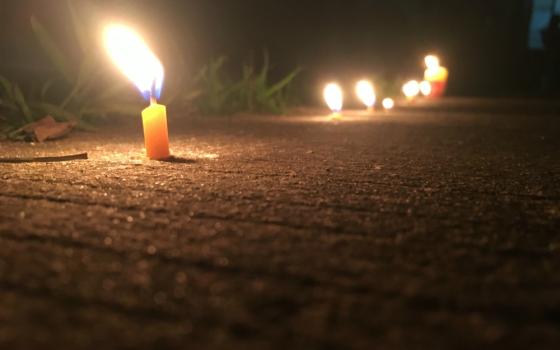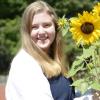Notes from the Field includes reports from young people volunteering in ministries of Catholic sisters. A partnership with Catholic Volunteer Network, the project began in the summer of 2015. This is our fifth round of bloggers: Katie Delaney is a Good Shepherd Volunteer with the Fundación Madre Josefa (Mother Joseph Foundation) in Santiago, Chile, and Lauren Magee is a Good Shepherd Volunteer at Hands of Hope, an income-generating project that provides dignified employment for villagers living with HIV/AIDS in Nong Khai, Thailand.
______
As I near the end of my journey in Thailand, I have been thinking a lot about my purpose.
Throughout this year, I have taken on many different roles and questioned my abilities. I have struggled to find my place in this self-sufficient community and have re-evaluated my position more times than I can count.
Before I left the United States in August 2016, I had mapped out the reasons why I was doing a year of service in Thailand, and I had expressed this to family and friends in the hopes that they would see my decision as logical. In actuality, I don't think any of these reasons actually mattered to me, and it's only now that I am realizing what was truly motivating me.
My heart was called to the Nong Khai community in a way that I still can't explain. It was as if a part of me had to be claimed here for me to be whole. I have always remained confident in my decision, but I have also often craved validation from those around me. I never needed to feel that I was making change in the world; I just needed to feel that I was making change in an individual. I've learned that the feeling of connecting with another person is the only thing I need to be happy and secure.
The catalyst for this realization was a conversation I had with one of the staff members, Angkhan.
The property on which I live houses staff, families, and patients under the care of the Good Shepherd Sisters. There are two residential centers, the Care Center and the Life Center, that serve primarily HIV-positive individuals who for a variety of reasons are in need of individualized care.
The Care Center has been nursing patients for decades, but the Life Center opened just a year and a half ago with the intention of assisting recovered patients who were more able-bodied and seeking independence. Many of its current residents began at the Care Center as they fought infection or received treatment for cancer or a recent surgery. Residents of the Life Center focus on obtaining housing, stable employment, and psychological healing.
Each resident has experienced different levels of trauma, whether it be the loss of loved ones, physical or emotional abuse, drug addiction, societal and family rejection, or the instability of poverty. The impacts of these traumas can manifest in their behavior.
For example, those betrayed by someone they trusted might be cautious in building relationships and respecting authority figures. Those who have resorted to stealing when they couldn't provide for themselves might still feel the temptation to do so even when food is abundant. Those who are still working on accepting their condition might have difficulty following rules because they are trying to regain a sense of control.
These instances can sometimes be interpreted as defiance toward staff. Even after private meetings and one-on-one counseling, some of the patients will still fall back into unhealthy patterns and choose to self-medicate, because it's what they've known for years before coming to the center. It takes time and patience to break a habit, but the process can seem tedious with little to no success at times.
Angkhan is primarily responsible for supervising the residents at the Life Center, leading daily meditations and activities as well as providing counseling. Every single patient has Angkhan's attention and is automatically loved. He will wash the feet of every patient and cut their nails as a way of proving his respect.
However, when you are dealing with traumatized populations, mistakes are inevitable as they struggle with impulse control, emotional intelligence, and decision-making. By consequence, those who care deeply may end up getting hurt and developing compassion fatigue. Although you may be able to overlook a few disappointments, it becomes exhausting after a while, and you want to give up trying.
Angkhan hit a point where he thought that caring might not be worth the pain he got in return. For many individuals in our community, this is all that they have, and if we reject them, they have nothing left to fight for. It's not a choice. Indifference is not an option.
Angkhan has supported me throughout my entire year, as he has served as my Thai language teacher, cultural translator and close friend. We have often had conversations surrounding this challenging dynamic with the patients, and, for months, Angkhan struggled with me to find his own sense of purpose.
One day, after a particularly hard week, he came to me with a metaphor. He said that our purpose in life was to collect books for our library. Every relationship we made, every experience we gained and every story that was shared stocked our shelves. The goal is not to have a full library, but to have one of wisdom and insight.
Angkhan explained that in counseling, all he could do was share books from his bookshelves, but it was up to each individual to add it to his or her own. He would continue to care for each and every patient, but he no longer felt responsibility for the residents' successes or failures. His purpose was not to "fix" anyone; it was to provide them with the tools to "fix" themselves.
The metaphor of a library stuck with me, and Angkhan's understanding of his purpose mirrors my own. My entire year has been dedicated to sharing myself with others and having the privilege of them sharing with me in return. There is a vulnerability that comes out of this exchange, and it has allowed me to grow closer to this community than I ever dreamed possible. I found a family, and it's almost unbearably painful to say goodbye.
I never want this place and these people to change, but I have to accept that once I leave, life will continue, and it will never be exactly how I remember it again. The pages that were written here and the library shelves that were filled will always remain, and it's comforting to know that I can access them at any time.
I believe that people are the best books you can read, and as I transition back to the States, they will continue to be my motivator. I never want to stop building my library, because without growth, we aren't truly living.
[Lauren Magee is a Good Shepherd Volunteer at Hands of Hope, an income-generating project that provides dignified employment for villagers living with HIV/AIDS in Nong Khai, Thailand.]



